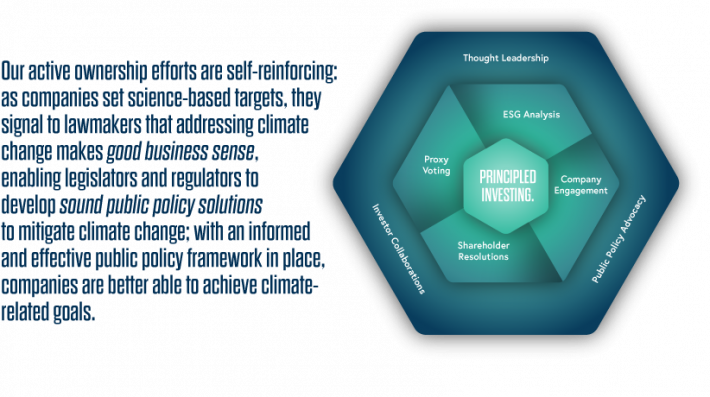Net Zero Asset Managers Initiative
Read below about our commitment to the Net Zero Asset Managers (NZAM) initiative.

About NZAM
The Net Zero Asset Managers (NZAM) initiative was launched in December 2020. It is an international group of asset managers with individual commitments to achieve net zero greenhouse gas (GHG) emissions by 2050 or sooner, in line with global efforts to limit warming to 1.5°C and avoid the most catastrophic consequences of climate change.
Why We Joined
Boston Trust Walden was an early signatory to the initiative in March 2021. We joined because we believe the changing climate is an extraordinary environmental challenge with far-reaching economic, environmental, and societal implications, creating risks and opportunities for companies and investors. We also recognize broad-based, absolute greenhouse gas emissions reductions as the best way to manage the risks associated with a changing climate.
The NZAM initiative also closely aligns with our firm’s position on climate risk and our long history advancing climate solutions.
Our Targets
NZAM signatories are required to set targets to meet this commitment for a percentage of assets under management (AUM) and disclose their progress over time.
In June 2022, we formally announced our own NZAM targets, which cover the discretionary equity assets we manage on behalf of clients. These assets represent approximately 80% ($11.8 billion) of our firm’s assets under management (AUM) as of December 31, 2021. Our targets focus on two key areas: encouraging the companies we invest in to set science-based greenhouse gas (GHG) emissions and reducing carbon intensity across our investment strategies.
Primary Target: Science-Based Targets
Our primary focus is for 40% of discretionary equity AUM to be invested in companies with science-based targets by 2025, and 100% of discretionary equity AUM to be invested in companies with such targets by 2040. Active ownership, including direct company engagement and proxy voting, is the primary means by which we will achieve this objective; our investment discipline will remain focused on investing in high quality companies. Progress toward our targets may not be linear as portfolio holdings and weightings change over time.
Notably, our active ownership efforts span the market capitalization range — and include Small and SMID cap equity holdings, which comprise a significant portion of our firm’s AUM. We believe all companies have a role to play in addressing direct and systemic climate risks. Smaller companies typically have fewer resources to focus on target setting and may need time to build capacity. With decades of experience engaging smaller companies, Boston Trust Walden is uniquely positioned to take on this challenge.
We utilized the Science Based Targets (SBT) Portfolio Coverage Method to establish our primary target. For simplicity, we used linear extrapolation of model holdings in equity strategies (US and International) from 23% as of year-end 2019. Each year approximately 4% of additional discretionary equity assets need to be invested in companies with science-based targets for us to meet our 2025 goal. Our target includes reductions in Scope 1 and 2, and for many sectors, Scope 3 emissions.
Secondary Target: Carbon Intensity
Our secondary target is for 100% of discretionary equity AUM to have a weighted average carbon intensity (WACI) of at least 50% less than respective benchmarks by 2030, as compared to the baseline year of 2019.
Since the carbon intensity of our model portfolio strategies** have been historically lower than their respective benchmarks, our objective in the coming years is to maintain our current levels. We also expect that our core focus on engagement, if our efforts are successful, could result in more carbon efficient portfolios.
We used elements of the methodology guidance developed by the Paris Aligned Investment Initiative’s Net Zero Investment Framework to establish this target. It is is based on a WACI calculation of Scope 1 and 2 emissions of the companies in which we invest. As data quality and associated methodologies improve for calculating Scope 3 emissions, we may evolve our approach.
**The figures presented are based on model portfolios that do not equal the investment composition, weights, or holdings of securities as those of client portfolios. The securities are not owned or traded by the model. Actual client portfolio holdings and results differ due to, tax status, client direction, and other investment considerations. The allocations to the securities within the model are rebalanced periodically however there is no guarantee that the manager would have traded or acted similarly or will act similarly to the model so there is no guarantee that an actual account would have achieved the same composition of holdings as the results presented.
How We Will Meet Our Commitment
Boston Trust Walden has the tools and experience necessary to meet its commitment to the initiative, including a rigorous investment discipline and multi-faceted approach to active ownership.

ESG Analysis: invest in high quality companies and evaluate their strategies, commitments, and performance to address climate risk

Company Engagement: encourage companies to set or improve greenhouse gas emissions targets and adopt responsible climate lobbying

Shareholder Resolutions: file proposals for vote at company annual general meetings (AGMs) compelling companies to address climate risk

Proxy Voting: vote proxies to promote accountability regarding climate action and disclosure

Investor Collaborations: leverage participation in investor initiatives to amplify the scope and scale of our impact beyond portfolio holdings

Public Policy Advocacy: advocate for and support climate policy at the regional, national, and international levels

Thought Leadership: educate stakeholders and lead by example on climate action

